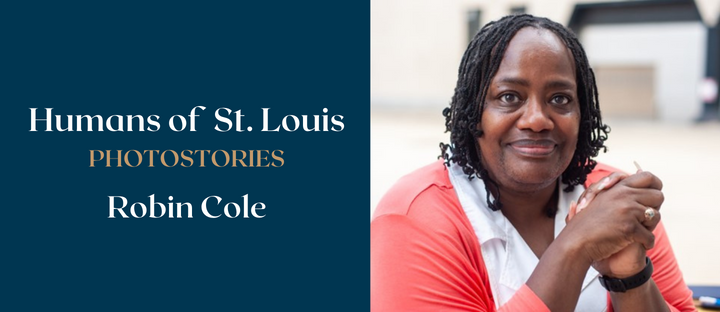The St. Louis Regional Health Commission partnered with Humans of St. Louis to share our stakeholders’ experiences across health care. These photostories, released from fall 2022 to spring 2023, highlight their experiences as patients and providers. The first provides the experience of Robin Cole, St. Louis Regional Health Commission Patient Advisory Board Co-Chair.
“I’m charged with letting people in the medical community know how to treat a patient, how to speak with them, and how to support them. Listen to our voices. We know our bodies. We know what we’re feeling.”
Robin Cole, Patient Advisory Board Co-Chair
Story 1
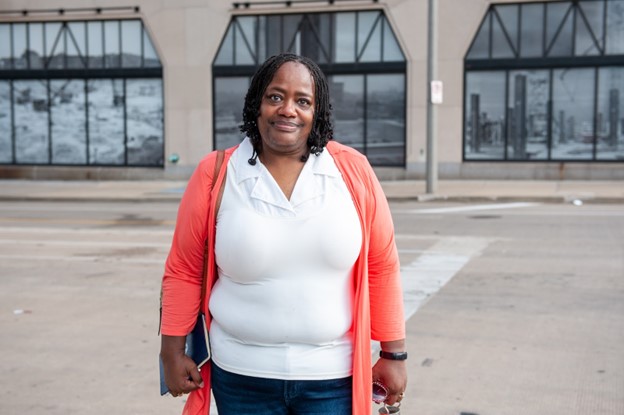
“As a young child, I only went to the doctor for routine examinations. However, I hated going to the dentist. It was always a painful experience. At age 15, the dentist decided he wanted to close the gap between my two front teeth. I had stitches for one week and when he removed them, he didn’t numb my mouth. After that, he said I needed to wear a retainer. My parents couldn’t afford to buy it for me, so I went through all of that pain without a very positive outcome.
Then, the first time I remember going to the optometrist was at 14. It was then that I received my keratoconus diagnosis. This word was definitely not in my vocabulary. My optometrist described it to me like this: ‘The front of your eye, the cornea, is normally shaped like a basketball. But yours is shaped like the end of a football.’ I wore eyeglasses for four years and the shape of my cornea continued to deteriorate. Eventually, I had to switch to gas permeable contact lenses which allow oxygen to pass through the lens material to the eye. I hated wearing them, but I got used to them and had a big improvement in my vision.
Other than those issues, I was pretty healthy. That all changed as I got older though. My health and the health of my family members ended up playing a major role in my life. I was in high school when my sister was diagnosed with diabetes. A nurse was scheduled to come to our home to show my mother, my sister, and me how to give my sister her insulin. I’ve always had a weak stomach when it comes to needles and blood. So when the nurse came, I made sure I wasn’t home. It’s a good thing my mother was there and learned. Years later, she was also diagnosed as an insulin-dependent diabetic.”
Story 2
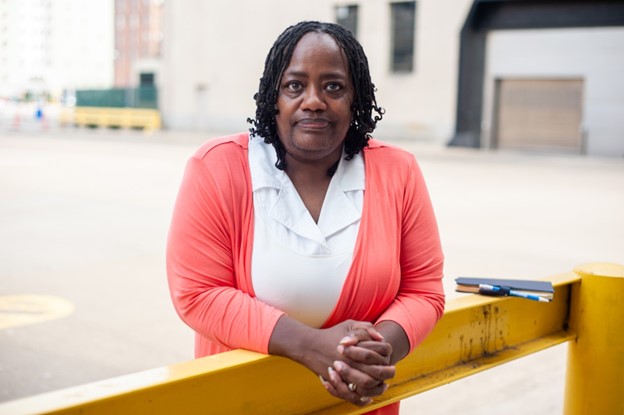
“My mother and sister never fully followed the doctor’s orders to keep their diabetes under control. Both continued to eat foods that caused their insulin levels to increase. Both did little if any exercise. Both went into kidney failure, had to start dialysis, and had heart issues. My sister also had uncontrollable swelling in her legs. When she went to the doctor one January, they told her she wasn’t doing well and probably wouldn’t make it the next couple of months. She made it to Christmas Eve that year. Prior to her passing, she was in the hospital. Seeing her connected to all of the machines was difficult for her two daughters, my mother, and the rest of her family and friends. The nurse informed us the machines were breathing for my sister and they kept her heart beating, but she was gone. My nieces had to make the decision to have their mother disconnected. I enjoy watching medical series on television. I’ve watched the scene numerous times where a doctor gives the time of death. It’s devastating to hear those words in person.
My mother worked for years at Busch Stadium after her day job. She’d get home at 11 o’clock at night and boy was she a go-getter. She was always doing something. And she always smoked, which the doctors told her not to. She would sneak away and do it, but I’d see cigarette burns in her comforter and fuss at her. My mother was something. She would curse anybody out. I learned a lot of off-color phrases from her. Mom wasn’t taking care of herself and she ended up in kidney failure. Her name was placed on the organ transplant list. Fortunately, a match was found and she had a kidney transplant. Her body eventually rejected the new kidney and she had to resume dialysis. Three months after my sister passed, we had to go through it again with the passing of my mother. When my sister died and then my mother, that was a rough four months.”
Story 3
“Anyone who knows me knows I’m always late. Well, one day, I told myself, ‘Mom’s got to go to dialysis. I’m gonna be on time.’ But I didn’t call her to let her know. I decided to surprise her. While I was preparing to leave home she called, but I didn’t answer. I didn’t want to ruin the surprise. When I got to her house, the furniture had been moved around, the lights and TV were on, and her eyeglasses were there. My mother never left the house like that. When I pulled up, there had been two police cars a bit further up, but I didn’t think anything of it.

I called my brother, the medical facility where our mom got dialysis, and then the nearest hospital. I didn’t get any info, so I started driving to the emergency room. On the way, a social worker from dialysis called to tell me my mom was in the ER I was on my way to. I said, ‘I’m on my way. What’s wrong with her?’ ‘Oh, they’ll tell you when you get there.’
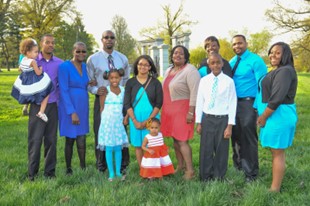
I was taken to a room with two chairs and a couch. I thought that was odd. Then a doctor and nurse came in and informed me my mother was brought in because of a cardiac arrest. She passed away. I was like, ‘You gotta be talkin’ about somebody else.’ They took me to see her and she was gone. Her death certificate listed every illness she had: high blood pressure, diabetes, heart failure, and renal failure.
Ya know, the mind has a way of protecting the body from trauma, so it didn’t allow me to really process it yet. Eventually, I thought about how she tried to call me and I wondered if she wanted to tell me she was hurting and sick and to hurry up and come and get her. She died alone. Was she scared? She must have called 911 because the police showed up and the EMTs moved furniture out of the way and left lights on.
I haven’t been able to get past that. I thought about therapy, but it’s hard because I work and most therapists work during the day. Some are virtual, but I can’t see opening up to a therapist over the computer. I don’t have anybody who I really talk to about all this. I’ve just been dealing with it myself.”
Story 4
“You don’t imagine being without your parents. When I was young, my father was like, ‘I’m gonna show you how to check your oil.’ I was like, ‘I don’t need to learn that. You’ll always be here.’ He died two months before his 50th birthday. He had a sore throat and tried all the home remedies. When he went to the hospital, he found out he had esophageal cancer. My mother told me he began smoking at the age of 12, and at 49 he just quit per the doctor’s orders. He was a furnace operator, so he was around all this ash and soot. My father passed away at home a year later.
I was a Daddy’s girl! I loved my daddy and everything about him! So my mother didn’t tell us he didn’t have long to live. But I remember she took about six weeks off of work to take care of him. Where we lived, there was a water tower a few houses down. You have to drive around it to get to the house. Well, I was listening to a cassette with new music and didn’t notice all the cars out front. Turns out, my daddy was still inside and people were coming to visit because he hadn’t been picked up yet. That was also traumatic — the first time I saw a person being zipped up in a body bag.
I thought his death was the hardest thing I’d ever go through. But there I was dealing with two more deaths three months apart. What was I to do? How was I to go on? I was a mother of four children. I had to learn how to live a new normal. It was difficult then and it’s still difficult.”
Story 5
“I needed to focus on my own health, but I didn’t embrace it quickly or easily. I remember one day I couldn’t move my hands and arms. I didn’t know what was going on. I went to the emergency room and they told me I had arthritis and referred me to a rheumatologist who did a bunch of tests and she diagnosed me with Systemic Lupus Erythematosus (SLE).
A lot of people with lupus have stories about it taking years to get a diagnosis. Fortunately, for me, it did not. I’d never heard of lupus when I was diagnosed, but it is hereditary. Turns out my aunt had it. Finding out I had it too was a lot to deal with. I started on a lot of medication and wasn’t happy about it. But, I wasn’t eating healthy, exercising, or doing any of that. I’m now more focused on trying to get healthy. SLE is relentless. It ravages my whole body. It’s affected my joints, my legs, my arms… I’d be in so much pain that I couldn’t even move my fingers. They would swell and ache so much that I couldn’t work. When you can’t work, you apply for Medicaid.
I spent about six months trying to get Medicaid. I kept getting turned down, so I kept applying. In the meantime, I went to a free clinic, even though it’s not really free. That was frustrating because if your appointment is at 10 AM, sometimes at 11:30 you’re still sitting and waiting.
I had a great doctor, but he left for another facility. Unfortunately, the next few doctors should have been in a different field; they were not good doctors. I’d see one, but the next month it was another. I remember I was telling one doctor what was going on and he said, ‘Let me go and get something for you.’ Then a nurse came in and sent me along. I was like, ‘I need to talk to him. He can’t say he’s going to do something and not do it.’ Going to the clinic, you’re not able to build a relationship with a provider, which is important because they need to know you and what you’re going through, not just write something on a chart.”
Story 6
“In 2018, I had a heart attack and a stroke. And they weren’t my first. This stroke affected the part of my brain that controls vision. I now had double vision and no depth perception. For a while, I had to wear a patch over one of my eyes. Then I moved to wearing eyeglasses with a prism in one of the lenses. Also the number of daily medications I was taking greatly increased. Doctors wanted me to go to rehab, but I wanted to go home where my kids could take care of me.
Being at home, I was bored. I didn’t have my mother or sister to talk to. Well, one day I decided to rearrange the furniture. I moved a chair in the basement, didn’t see something that was there, and fell on the concrete. I ended up busting my lip and getting stitches. So I was told I couldn’t live alone anymore. I moved in with my oldest son and his family and it was difficult. I’d always been independent and didn’t really rely on anyone for anything. Yet, there I was without my own house, no job, and unable to drive. This was a major life adjustment for me, but I had no choice but to learn how to deal with it. Because my son worked I had to rely on transportation through Medicaid. That was horrible. One driver would fall asleep while driving and the drivers were always late picking me up from my appointments. Another picked me up with a tire low on air and the tire continued to leak. But, I had to go to physical therapy.
Medicaid doesn’t pay for physical therapy. So I went to St. Louis University Physical Therapy Clinic located in a building in North City. When my appointment ended, I had to sit outside for two hours waiting to be picked up. All I could hear were gunshots. It’s awful what a person has to deal with when they do not have health insurance. My heart attack and stroke happened in January 2018, and I was released to return to work in March 2019 at the start of the pandemic.”
Story 7
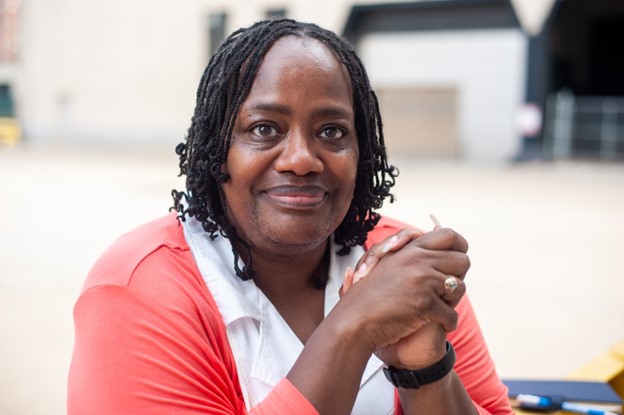
“Our Patient Advisory Board was contacted by Washington University School of Medicine to have some of our members speak to their first-year students. They were really appreciative to hear our experiences with the medical community and I liked talking to them, too. I shared how I went to the emergency room one time because I had chest pain and the doctor asked, ‘How many cigarettes do you smoke a day?’ He didn’t ask me, ‘Do you smoke?’ He just assumed I smoked. Was it because I am Black? Was it because I am obese? Who knows? But what I told the students was, ‘Don’t just make assumptions. Be supportive. If someone’s in the hospital hurting, they need you to be there for them. If you are with a patient who is already in pain, don’t cause them further anguish. And just so you know, I do not smoke and I never have.’
There are people, good or bad, who need help in every part of town. So when I got on the RHC patient advisory board, I was very happy. I told those students, ‘Share my story with your classmates,’ because I share it with doctors, nurses, and pharmacy techs and they should also. When I learn new things through the RHC, I share them with my coworkers, friends, and family. I want everyone I come in contact with to know what I know. Being on the advisory board puts me on a platform to do that: ‘This is what we need. This is what’s lacking. This is how we can help each other.’”
Story 8
“I’m charged with letting people in the medical community know how to treat a patient, how to speak with them, and how to support them. Listen to our voices. We know our bodies. We know what we’re feeling. Medical professionals need to know they have to meet patients where they are and build from there. Yes, maybe I’m not eating right, but you have to understand that if I’m in a food desert, and the convenience store is my only option, then that’s where I have to buy my food. It doesn’t mean I don’t care about my body, but I just cannot do what maybe I’m supposed to do right now. We have to shop at the store we’re able to get to or buy what we can afford.
Let me tell you what would work for me. Let’s set up a plan. Give me access to the things I actually need — transportation, medical, pharmacy, medication. Health equity means if you make $100,000 and you can get to see the best doctors, I should be able to make $24,000 and still get the best doctors. You’re getting the vaccine, I should be able to get the vaccine. Everybody should get the same services no matter their income, where they live, or their socioeconomic status. Everybody should have access to quality care. The gap needs to shrink until there is no lack.”
“If you have a desire to help members of your community, if you’re struggling with a medical issue, if you have insurance or don’t, then we want you on the board. We want you to be heard. We want to support you. Help us reach out to others. No person will be turned away. If you have something going on in your life, medically, and you need help, come to us. Join our team. We will be your support. Yes, sometimes it’s hard to reach people, but we can’t give up. The word has to constantly be put out there: on the news, in commercials. There is help. There is access. We are here for you.”
Robin Cole, Patient Advisory Board Co-Chair

